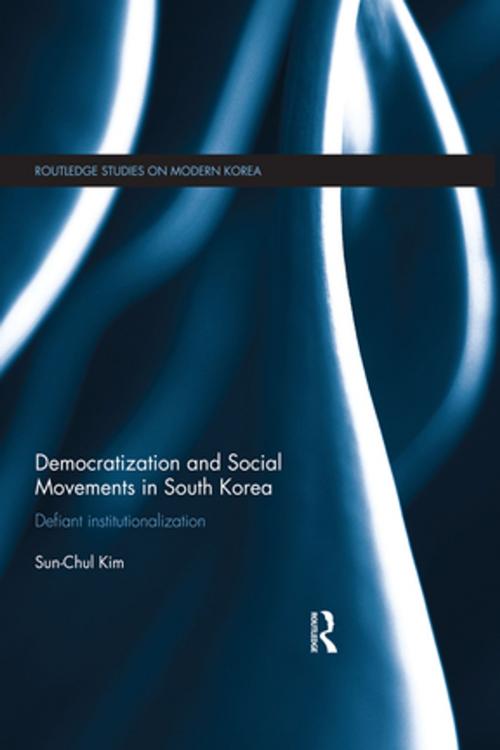Democratization and Social Movements in South Korea
Defiant Institutionalization
Nonfiction, Social & Cultural Studies, Political Science, Government, Democracy, Social Science, Cultural Studies, Ethnic Studies| Author: | Sun-Chul Kim | ISBN: | 9781317282877 |
| Publisher: | Taylor and Francis | Publication: | January 29, 2016 |
| Imprint: | Routledge | Language: | English |
| Author: | Sun-Chul Kim |
| ISBN: | 9781317282877 |
| Publisher: | Taylor and Francis |
| Publication: | January 29, 2016 |
| Imprint: | Routledge |
| Language: | English |
South Korea provides an intellectual challenge in the fields of social movements and democracy in that intense mobilization and the strong influence of social movements have accompanied steady democratization for more than two decades, despite major theories having predicted otherwise.
This book examines how social movements in previously authoritarian contexts evolve after democratic transition,using South Korea as a case study. It explores how democratic change influences the form of social movements, and how social movements affect the pace and direction of democracy in turn. It explains how South Korean social movements were able to attain strong political influence by focusing on four causal factors: the configuration of major political actors during the transition period, the relational dynamics among social movement groups, the relationship between social movements and institutionalized political actors, and the impact of transnational forces in the post-transition period. Unlike previous scholarship, the book takes a historical, actor-centered, and process-oriented approach that closely follows the interactions among contending actors through event sequences, rather than being driven by abstract theoretical frameworks. In doing so, it analyses uses a broad range of evidence, including police records, untapped activist documents, presidential memoirs, newspaper accounts and original data sets.
Shedding light on the complex political reality that gave rise to a contentious civil society in South Korea after democratization, this book also illuminates the institutional conditions that can help promote domestic peace and stability. Therefore it will be of great use to students and scholars of Korean Studies, Korean politics and social movements, as well as policy makers.
South Korea provides an intellectual challenge in the fields of social movements and democracy in that intense mobilization and the strong influence of social movements have accompanied steady democratization for more than two decades, despite major theories having predicted otherwise.
This book examines how social movements in previously authoritarian contexts evolve after democratic transition,using South Korea as a case study. It explores how democratic change influences the form of social movements, and how social movements affect the pace and direction of democracy in turn. It explains how South Korean social movements were able to attain strong political influence by focusing on four causal factors: the configuration of major political actors during the transition period, the relational dynamics among social movement groups, the relationship between social movements and institutionalized political actors, and the impact of transnational forces in the post-transition period. Unlike previous scholarship, the book takes a historical, actor-centered, and process-oriented approach that closely follows the interactions among contending actors through event sequences, rather than being driven by abstract theoretical frameworks. In doing so, it analyses uses a broad range of evidence, including police records, untapped activist documents, presidential memoirs, newspaper accounts and original data sets.
Shedding light on the complex political reality that gave rise to a contentious civil society in South Korea after democratization, this book also illuminates the institutional conditions that can help promote domestic peace and stability. Therefore it will be of great use to students and scholars of Korean Studies, Korean politics and social movements, as well as policy makers.















